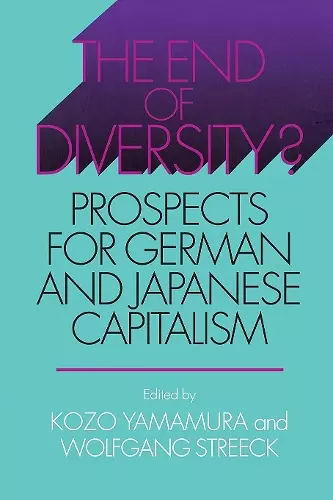The End of Diversity?
Prospects for German and Japanese Capitalism
Kozo Yamamura editor Wolfgang Streeck editor
Format:Paperback
Publisher:Cornell University Press
Published:27th Mar '03
Currently unavailable, and unfortunately no date known when it will be back
This paperback is available in another edition too:
- Hardback£108.00(9780801440885)

After the devastation of World War II, Germany and Japan built national capitalist institutions that were remarkably successful in terms of national reconstruction and international competitiveness. Yet both "miracles" have since faltered, allowing U.S. capital and its institutional forms to establish global dominance. National varieties of capitalism are now under intense pressure to converge to the U.S. model. Kozo Yamamura and Wolfgang Streeck have gathered an international group of authors to examine the likelihood of convergence—to determine whether the global forces of Anglo-American capitalism will give rise to a single, homogeneous capitalist system.
The chapters in this volume approach this question from five directions: international integration, technological innovation, labor relations and production systems, financial regimes and corporate governance, and domestic politics. In their introduction, Yamamura and Streeck summarize the crises of performance and confidence that have beset German and Japanese capitalism and revived the question of competitive convergence. The editors ask whether the two countries, confronted with the political and economic exigencies of technological revolution and economic internationalization, must abandon their distinctive institutions and the competitive advantages these have yielded in the past, or whether they can adapt and retain such institutions, thereby preserving the social cohesion and economic competitiveness of their societies.
Following the Second World War, Germany and Japan embarked on creating unique forms of capitalism, distinct from the Anglo-American model yet fully integrated with the U.S. side in the new bi-polar world.... This series of insightful studies of the two models—edited by noted Japanese and German academics—offers ten chapters explaining and contrasting the two paths to economic development taken by the defeated powers. The timing of the publication is also prescient given the deep and lasting performance crisis in both countries.
-- Matthew Saltmarsh * Journal of European Affairs *The eleven chapters of this book offer in-depth analyses of the various economic, financial and social aspects of the ongoing transformation of German and Japanese capitalism from which it must be concluded that a number of changes are inevitable. It also emerges, however, that the embedded capitalism of the German and Japanese kinds had, and continue to have, their strong points.... While this book concentrates on comparing and contrasting Japanese and German capitalism with Anglo-American capitalism, it should not be overlooked (and is not overlooked by its authors) that, notwithstanding a number of striking parallels, the German and Japanese models also differ from each other. Elucidating the characteristics of these two varieties of capitalism is but one of the merits of this well-argued book.
-- Florian Coulmas * The Japan Times *The End of Diversity? asks one of the most important questions of our day. In the face of globalization, is it possible to maintain forms of capitalism that minimize poverty while maintaining high standards of living?.... The book deserves to be widely read, not only by those interested in Germany and Japan, but anyone interested in thinking about how capitalism does and can work. The chapters are quite readable and throughout show the connections between society, economy and politics. The book could be readily used in a class for advanced undergraduates.
-- Mark Tilton, Purdue University * Pacific AffaiISBN: 9780801488207
Dimensions: 235mm x 155mm x 24mm
Weight: 907g
424 pages